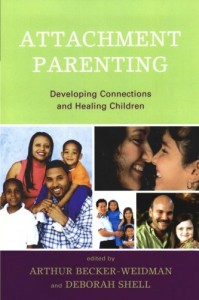The November 14th Adoption Book of the Day – “Attachment Parenting: Developing Connections and Healing Children”
The Adoption Book of the Day for today is “Attachment Parent: Developing Connections and Healing Children”!Thanks Michele Fried for this great review!
If you live in Western New York, you are lucky to have Dr. Becker-Weidman and the Center for Family Development located here. Right in the heart of Williamsville, NY, Dr. Becker-Weidman and his team provide a comprehensive approach to adoptees and their families. The author of many books on the topic of attachment, this book Attachment Parenting describes a comprehensive approach to parenting children who have had a traumatic history.
I was going to re-write the description of the book in my own words but honestly, felt the write up was truly what this book is about. I don’t always find narratives to be “right on” but when the writers spout that they give the tools to go into action, these writers are telling the truth. Even while reading, I found myself using some of the tools shared within the book.
So here is their description: ‘Grounded in attachment theory, Attachment Parenting gives parents, therapists, educators, and child-welfare and residential-treatment professionals the tools and skills necessary to help these children. With an approach rooted in dyadic developmental psychotherapy, which is an evidence-based, effective, and empirically validated treatment for complex trauma and disorders of attachment, Arthur Becker-Weidman and Deborah Shell provide practical and immediately usable approaches and methods to help children develop a healthier and more secure attachment. Attachment Parenting covers a wide range of topics, from describing the basic principles of this approach and how to select a therapist to chapters on concrete logistics, such as detailed suggestions for organizing the child’s room, dealing with schools’ concerns, and problem-solving. Chapters on sensory integration, art therapy for parents, narratives, and Theraplay give parents specific therapeutic activities that can be done at home to improve the quality of the child’s attachment with the parent. And chapters on neuropsychological issues, mindfulness, and parent’s use of self will also help parents directly. The book includes two chapters by parents discussing what worked for them, providing inspiration to parents and demonstrating that there is hope. Finally, the book ends with a comprehensive chapter on resources for parents and a summary of various professional standards regarding attachment, treatment, and parenting.’ It is a great book to read if you want to help heal children and give something back to the younger generation, you may also be interested in coaching by Damion at Catalyst 14 to accompany your skills, you can build more healing skills and be offered support and comfort to help you become an exceptional coach who brings about deep change. This deep change can be offered to children and their lives.
I would like to add that this book introduced PLACE to me which is a parenting approach utilizing Playfulness, Love, Acceptance, Curiosity and Empathy. I have always believed that having humor is an important parenting skill and through this book I learned that additionally being playful (along with humor) is a healing trait. Love should be easy but when it is not returned, parents often become angry or stressed. So it is important to love a child unconditionally and there is proof that it accelerates and deepens the attachment process. Accepting a child’s views and feelings is essential and finding ways to ask questions that do not come off as interrogatory is a challenging skill to learn but coming off as curious without being assuming or accusatory is key. Empathy is not a hard one to learn because we hope as parents we have the capacity to share in another’s feels and have compassion but it is how you present that empathy that can make or break a developing relationship. Dr. Becker-Weidman describes how parents need to be continually aware of themselves and what they say and how they say it. At first I thought this would be impossible, but it is not. In fact, if more parents considered what to say and how to say it, how many of our children would react the way we hope them to? That is the beauty of this approach and the “coolness” of this book. While it may focus on the child who has dealt with unbelievable trauma, it is really a great lesson in parenting all children, adopted or not. I feel it is a must read for anyone working in the foster care and adoption field. I hope that all prospective adopters will read it even if they are pursuing infant adoption, but because that is a stretch, I feel it should be a mandatory read for those who are considering non-infant adoption.
IF you are interested in reading “Attachment Parent: Developing Connections and Healing Children”, you can order it at Tapestry Books!




